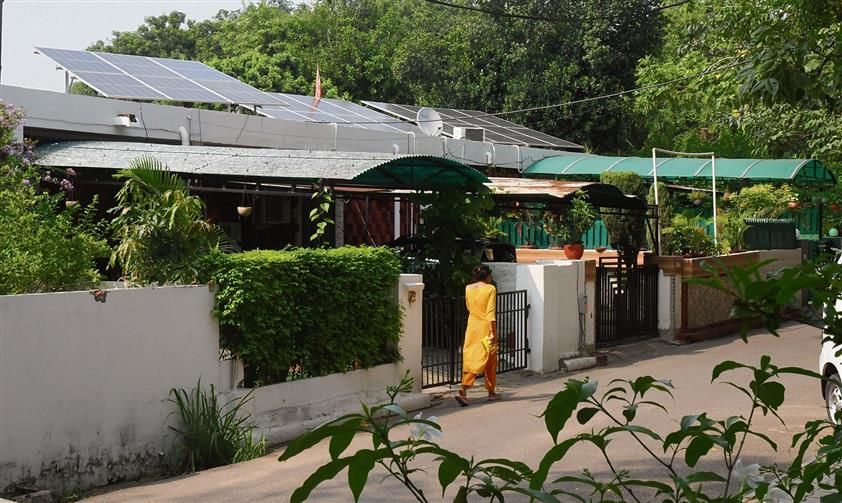In 12 yrs, a big green leap by Chandigarh
Dushyant Singh Pundir
Chandigarh, July 18
In a remarkable achievement, the UT Administration has been able to reduce 1,79,455 metric tonnes (MT) of carbon dioxide (CO2) with the generation of 260 million units (MUs) of solar energy in the past nearly 12 years. The Administration has planned to make Chandigarh the country’s first carbon-free city by 2030.
According to officials of Chandigarh Renewable Energy and Science & Technology Promotion Society (CREST), the nodal agency for implementation of green energy projects in the city, the UT Administration has already installed 66.066 MWp (Megawatt peak) grid-connected rooftop solar power plants on 4,815 government and private sites in the city. While 37.354 MWp of power is generated from rooftop solar power plants installed on 952 government sites, the remaining 28.712 MWp come from those installed on 3,863 private buildings. Since 2011-12, this has helped in production of 260.08 MUs of power and reduction in 1,79,455 MT of CO2 till June 30 this year.
75 MWp target generation for this year
- The UT Administration has already installed 66.066 MWp (Megawatt peak) grid-connected rooftop solar power plants on 4,815 government and private sites in the city.
- While 37.354 MWp of power is generated from plants installed on 952 government sites, the remaining 28.712 MWp comes from the units installed on 3,863 private buildings.
- Against the ambitious target to achieve 75MWp of solar power in the UT by December this year, the Administration has planned to install rooftop solar power plants on all government buildings by the year-end and on all private buildings by 2026.
Against the ambitious target to achieve 75 MWp of solar power in the UT by December this year, the Administration has planned to install rooftop solar power plants on all government buildings by the year-end and on all private buildings by 2026.
The officials stated that all government departments planned to achieve ‘Net Zero’ emissions by the year 2030. The long-term aim is to run the city entirely on renewable energy by 2047.
Paryavaran Bhawan, the Burail Jail complex and all government schools are ‘Net Zero’ in terms of fulfilment of their energy requirement through solar power. Paryavaran Bhawan is the first five-star rated building in the city as per the Bureau of Energy Efficiency Standards. The city was honoured with the first prize in the State Energy Efficiency Performance Award-2023 (Group-4), presented by President Droupadi Murmu in New Delhi on December 14 last year.
The largest floating solar photovoltaic technology (SPV) power plant in North India of 2.5MWp has already been installed and commissioned at the Sector 39 Waterworks. To enhance the share of green energy, CREST has set in motion the process to set up two more floating SPV power plants of a total capacity of 3 MWp (1.5 MWp each) at the Sector 39 Waterworks. The power plants would be set up on two storage tanks (No. 5 and 6) at a cost of nearly Rs 17.80 crore, including 10-year operations and maintenance (O&M) cost.









